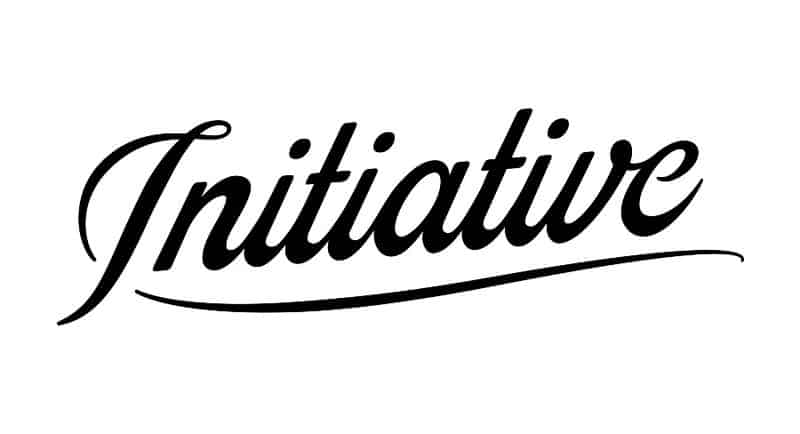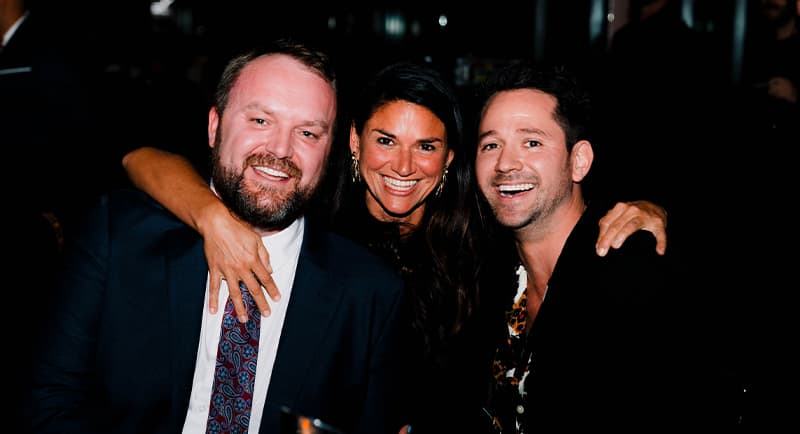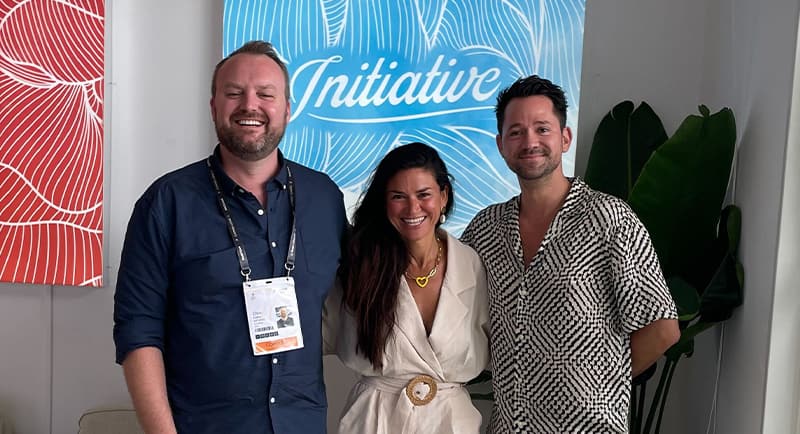The Cannes Lions International Festival of Creativity has wrapped up for 2023, with the event having brought together those that work in creative communications and advertising from every corner of the planet.
Mediaweek has been on location in the South of France, and spoke to some of the most influential people in both Australian and global media. Today is the Initiative Australia team: CEO, Melissa Fein; managing director, Sam Geer; and chief strategy and product officer, Chris Colter.
Initiative in Cannes
Bringing the Initiative team across the world to France is no small task, but the trip has a number of benefits for the trio, including reflection on their own work – and sizing up the global competition.
Fein: “It’s the midpoint in the year where we can take stock and reflect on the last 12 months – we’re now using this as a flagship moment of the year to look at the work that we’ve been producing and find inspiration and motivation.
“But we’re a competitive bunch, and we also submitted work this year, so we want to make sure that we’re here to celebrate the work that we’re producing. We’ve got amazing marketers on the ground with us, that are also looking for that inspiration and motivation.
“It’s also just a wonderful time to connect with some of our global teams and our global clients. We don’t get a lot of the senior global marketers coming to Australia, this is a perfect opportunity to get some face time with them and make sure they understand how important Australia is for their business as well.”
Colter: “We definitely come here for the work first and foremost, we pride ourselves on being a very creative media agency. Coming to the festival of creativity is really important because you get the top echelon of work.
“The calibre of the speakers is really good as well, you learn some things, take away a nugget or two, and that sets you up for what the benchmark is to beat next year – which is important for us as competitive people.”

The Cannes Lions Festival of Creativity is nothing if not an event that gets people thinking. When it came to the work put forward at this year’s festival compared to other times that the trio have made the trek to Cannes, Colter says that there is one particular difference in this year’s highlighted work.
Colter: “I haven’t walked away this year going ‘that’s the one absolute standout campaign’ like I have in other years, when it was really obvious as to what one piece of work got everyone talking about around town. I think that’s interesting in and of itself, and might be symptomatic of breadth, it might be symptomatic not having nailed that one industry-defining piece of work.
“From a media perspective, I thought the work that got through in that was really interesting – the separation between using media to innovate and propel an idea versus just distribute, I thought the line was a bit too blurred there if I’m honest. I think they could have had the role that media plays in accelerating ideas in culture a lot more front and centre.”
Reflecting on the work from all corners of the globe on the world stage at the 2023 Cannes Lions Awards, Geer says that “we can do much better defining the role of media, and I think that should be something that the jury is super clear on.”
Geer: “We talked to some of the jury members this year, and I think there was a lot of debate and a lot of questioning in the room about whether or not something was media – and given how much debate there was, I still saw a lot of the work and thought, ‘well, that’s not media’.
“People will say ‘this is a great use of print’, and I look at it and think ‘no, that’s a print ad’. The use of media is they printed a great idea on a double-page spread, that’s not a great use of print, that’s a great idea that happens to be amplified through print. I think a lot of media agencies see it as their role to just amplify and not actually take the same creative craft, care, and attention into every single media execution to try and push it as far as it can go – and for us, that’s been a big, competitive advantage.”
Colter: “I don’t care if creative agencies win media awards, so long as the media is interesting, and you can see how it elevated the idea, or expanded it, or used media in an innovative way. I think the reason why they’re winning awards more often than media agencies is that media agencies are shithouse at writing awards – we don’t have production teams on tap so we can get a creative director to look at this and a videographer to create it. It’s usually Sam and I together in a room, in the five minutes we have in between pitching.
“I wish there was a way for us to get better at packaging the work, because I do think that in the media work out of Australia, there is some game-changing work that exists out there. But its potential is lost in its packaging.”
One region that did particularly well at this year’s awards was South America, with Geer pointing towards their willingness to tackle particularly ambitious work as a reason for the success.
Geer: “There’s so much focus on agencies in Cannes, we’re all talking about the media agencies, the creatives, and who’s picking up work. At the end of the day, you need clients to be encouraging you to do brave work and be willing to sign that off.
“In South America, countries like Brazil, there is a greater level of acceptance with ambitious or brave work – there’s a feeling of less to lose and more to gain. Whereas there’s a huge amount of discussion around risk appetite in Australia, which is completely fair. The onus is on an agency partner to try and push those clients and give them the safety or support around ideas to know that it’s going to be okay, and that they should have a risk appetite.”
Outside of the awards, the Initiative trio say that there have been two major themes the team have noticed at this year’s event – the first being the hot topic on everyone’s mind: Artificial Intelligence.
Fein: “Everyone’s here to see AI, I think that’s been the theme of the week. It’s topical, we come here to hear some of the best speakers that we might not get access to in Australia, so there have been some really interesting takes on the human element and how we’re going be able to execute the algorithms. There have been some really good takeouts.”
Aside from AI dominating conversations across Cannes, Diversity Equity and Inclusion has also been thoroughly discussed in the festival’s speaking sessions.
Geer: “DE&I was a big one, when you look at the agenda every day in the Palais it’s either an AI or DE&I conversation. I think that’s great, those two things are intrinsically linked and DE&I has been a big part of Cannes for a number of years now.”
Fein: “What I was welcoming in some of those DE&I panels is the evolution that we’ve seen come from just the inclusion conversation. There was some really amazing focus on disability and the areas that we haven’t really, as an industry, formally addressed because we’ve all been so focused on gender equality and inclusion. That is really important, but I’ve been really encouraged to see how that was so progressed in those conversations.”
On the flip side of the coin, what is missing can be just as important as what is being shouted from the rooftops.
Geer: “I was very interested in things I didn’t see – the Metaverse was massive last year, and there was not even one conversation this year. It was a punch line. I think it shows how obsessive we can get about things in a cultural moment, but I don’t think AI is going to be like that.”

Colter, Fein, and Geer at Mediaweek’s Next of the Best Awards
Looking Ahead
It’s always difficult to predict what comes next without a crystal ball, but the trio are certain of one thing: it’s full speed ahead for Initiative Australia.
Geer: “We’ve still got a lot of growth left. People talk about the awards and new business wins, but what comes with that is building a lot of depth in the agency. There’s depth at every single level in the agency, we can come here and the team is still absolutely smashing it on the ground. I think that allows you to continue to scale and not scale too quickly, or sacrifice other things and grow for the sake of it.”
Fein: “It hasn’t always been roses, we haven’t always been able to come to Cannes and feel like things are okay back at the ranch. This has been years of brick-by-brick making to get to this point.
“This is where we can also not just look inwards, but outwards. The lens we put over everything is asking ‘can we open source this idea?’ – the impact on industry becomes really a big focus of ours as well. We’ve got some amazing things coming up that we’re not doing as a closed Initiative event, it’s for the industry that we’re creating things.”
One of the big future focuses for Initiative is continuing to invest in the up-and-coming talent in the industry.
Geer: “We’ve become pretty notorious for having the best youth talent, and investing in that next generation for us means that we’re building a stable that we can continue to grow.”
Fein: “There have been a lot of naysayers in the industry, they’ll say ‘you’re hiring kids’. Sam and Colts are the two smartest people in the industry – of course, I’m very biased – and what that delivers is that we can attract some of the biggest young talent.
“I’ve never been ageist on either side, old or young. I think that that’s really important because people see young people coming in and think they’re inexperienced, what would they know? But they are bloody smart, these kids.”
Under the guidance of the trio, Initiative Australia has picked up a swathe of accolades – including gold at the Campaign Global Agency of the Year awards, and two trophies at Mediaweek’s inaugural Next of the Best awards.
When asked how the relationship works between the three of them, and why it’s resulted in such success for Initiative, the trio all point to the trust and respect between them.
Fein: “There’s a basic, complementary skill set. We all know where each other’s strengths and weaknesses are, and we don’t bother even wasting each other’s time. We say it as it is to each other, and there’s no duplication in workloads – we divide and conquer.
“There’s no bullshit, and we just have so much mutual respect for each other.”
Colter: “Everyone’s got your back at any given moment – If Sam or Mel are on something, I’ve got abject trust that they’re going to absolutely nail it. That is something that’s really rare and special to have at this level.
“Also, the speed at which we make business decisions together. We joke that we run this business on text, but it’s only possible because of that trust and intuitive understanding of what everyone brings to the table. You can’t fake it.”
Geer: “There’s a lot of appreciation for each other, and everything the others said as well. The other thing that you can’t fake is that we just really like each other, genuinely, we spend a lot of time together. I think so many business environments see relationships or partnerships crack, we’ve had the opposite.”
–
Top Image: Initiative Australia’s Chris Colter, Melissa Fein, Sam Geer

